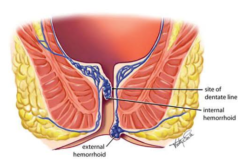
Understanding Hemorrhoids During Pregnancy: Causes and Risk Factors
Pregnancy often comes with a variety of changes and potential challenges for expectant mothers, including the development of hemorrhoids — a common but uncomfortable condition. During this remarkable yet taxing period, a woman's body undergoes profound transformations that can affect her vascular system, notably in the pelvic region. In this section, we'll explore the causes behind the increased risk of hemorrhoids during pregnancy, discuss contributing factors, and highlight prevention and management tips to ease discomfort for soon-to-be mothers. Whether you're expecting your first child or are already navigating the joys and hurdles of motherhood, understanding hemorrhoids can lead to improved well-being and peace of mind during pregnancy.
Pregnancy is a beautiful yet complex journey that brings various physical changes, one of which can be the development of hemorrhoids. Understanding the causes of hemorrhoids during pregnancy is crucial for expectant mothers to manage this uncomfortable condition effectively.
Hemorrhoids in Pregnancy: A Common Occurrence
Hemorrhoids are swollen veins in the rectal area, and they are particularly common during pregnancy. This is primarily due to several physiological and hormonal changes that occur during this period. As the uterus grows and expands to accommodate the developing fetus, it puts pressure on the veins in the pelvic region, causing them to swell and become enlarged. Additionally, increased levels of progesterone during pregnancy can also contribute to the weakening of the vein walls, leading to hemorrhoids.
Increased Blood Flow and Uterine Pressure
During pregnancy, there is an increase in blood volume and flow to support the growing fetus. This increased blood flow and pressure can cause the veins in the rectal area to swell and stretch, leading to hemorrhoids. Additionally, as the uterus enlarges, it puts pressure on the pelvic veins and the inferior vena cava (a large vein on the right side of the body). This increased pressure can exacerbate the swelling of veins in the pelvic area, further contributing to the development of hemorrhoids.
Hormonal Changes
Pregnancy involves significant hormonal changes, particularly an increase in progesterone. This hormone causes the walls of the veins to relax, making them more prone to swelling. Progesterone also contributes to a slower gastrointestinal tract, leading to constipation, another risk factor for hemorrhoids. Furthermore, hormonal changes can also cause the walls of the veins to become more elastic and stretchy, further increasing the likelihood of hemorrhoids.
Constipation and Straining
Many pregnant women experience constipation, partly due to the effects of progesterone on the intestines. Constipation leads to straining during bowel movements, which can aggravate hemorrhoids or lead to their development. Additionally, the growing uterus can put pressure on the rectum, making it harder to pass stools and potentially leading to constipation and straining.
Prevention and Management Strategies for Hemorrhoids
Preventing and managing hemorrhoids during pregnancy involves a holistic approach that focuses on diet, exercise, and lifestyle changes. Increasing fiber intake through fruits, vegetables, and whole grains can significantly alleviate constipation and reduce straining during bowel movements. Staying hydrated by drinking plenty of water is equally important, as it helps to soften stool and promote regularity. Additionally, engaging in regular, pregnancy-safe exercise can enhance circulation and reduce the pressure on the veins in the pelvic area. Pregnant women are also advised to avoid standing or sitting for prolonged periods, which can increase the risk of hemorrhoids, and instead, take short, frequent breaks to move around. Using a supportive cushion while sitting can also help relieve pressure. These strategies, combined with the guidance of a healthcare provider, can help expectant mothers prevent the onset of hemorrhoids or manage the symptoms if they occur.
Managing Hemorrhoids During Pregnancy
While hemorrhoids can be uncomfortable, there are several ways to manage and reduce discomfort during pregnancy:
- Dietary Changes: Eating a high-fiber diet and drinking plenty of fluids can reduce constipation and straining.
- Regular Exercise: With a healthcare provider's approval, regular exercise can stimulate bowel function and reduce pressure on rectal veins.
- Avoiding Prolonged Sitting or Standing: Alternating positions and taking frequent breaks can alleviate pressure on the pelvic veins.
- Using Cold Compresses: Applying ice packs to the affected area can help reduce swelling and discomfort.
- Proper Bathroom Habits: Avoid straining during bowel movements and do not delay going to the bathroom when the urge arises.
Conclusion
Hemorrhoids are a common side effect of pregnancy, largely due to increased blood flow, hormonal changes, and constipation. While they can be uncomfortable, understanding their causes can help in taking preventive measures and managing symptoms effectively. If hemorrhoids develop or symptoms worsen, it's important to consult with a healthcare provider for appropriate treatment options. Post-pregnancy, these symptoms often improve, but proper care during pregnancy can significantly ease discomfort and reduce the impact of hemorrhoids.
